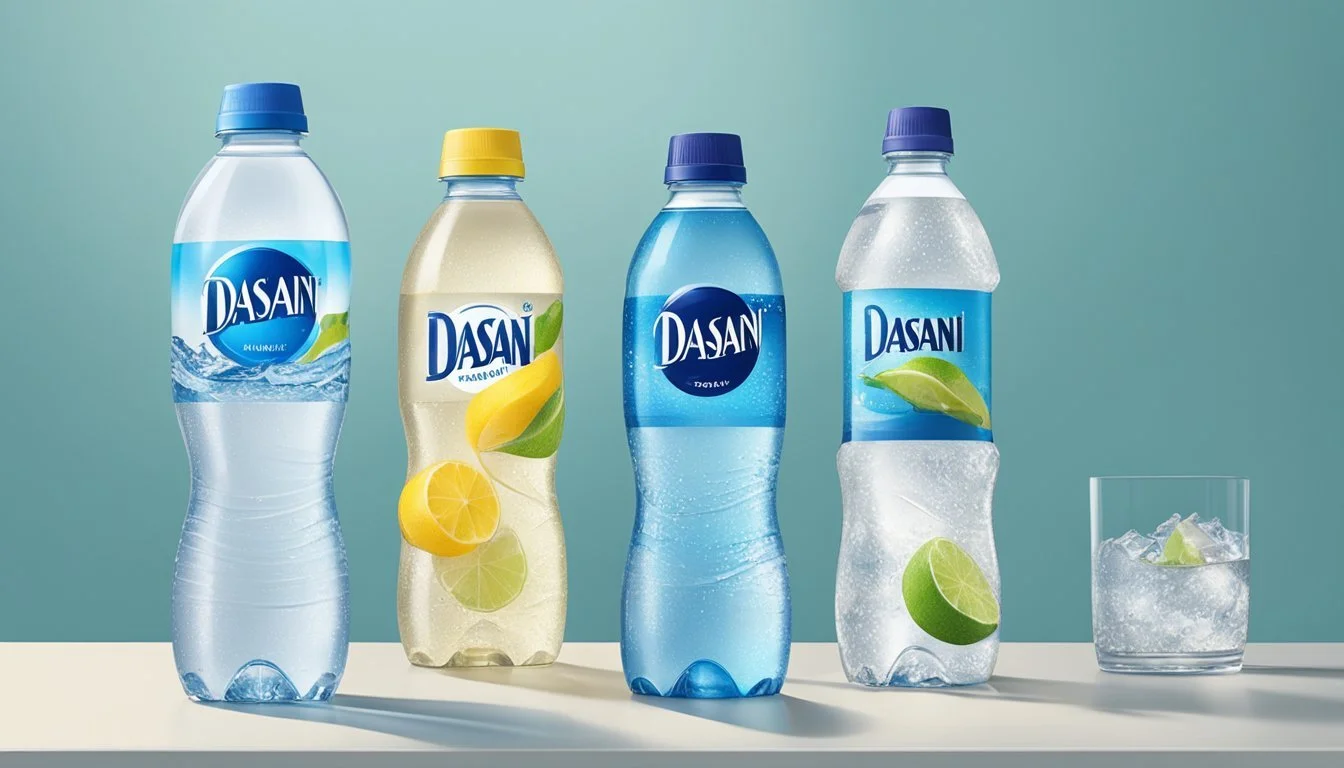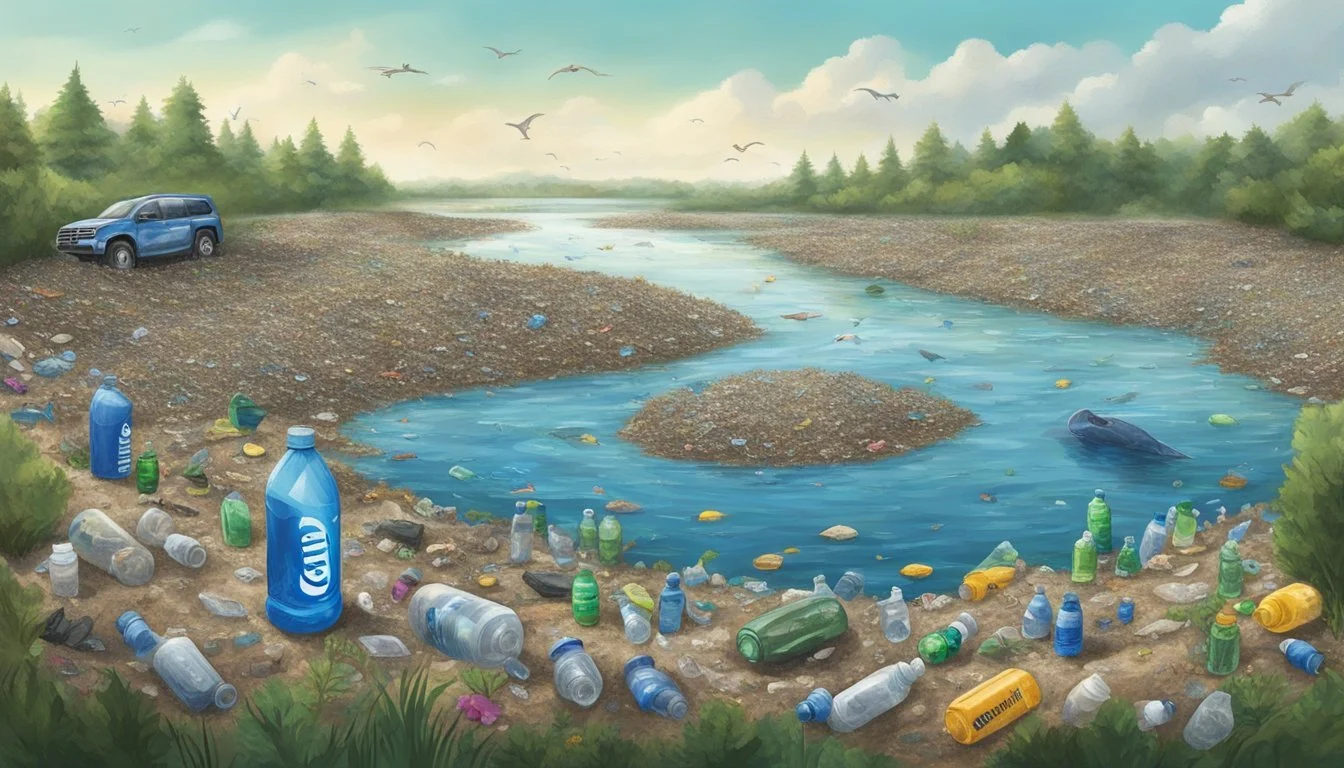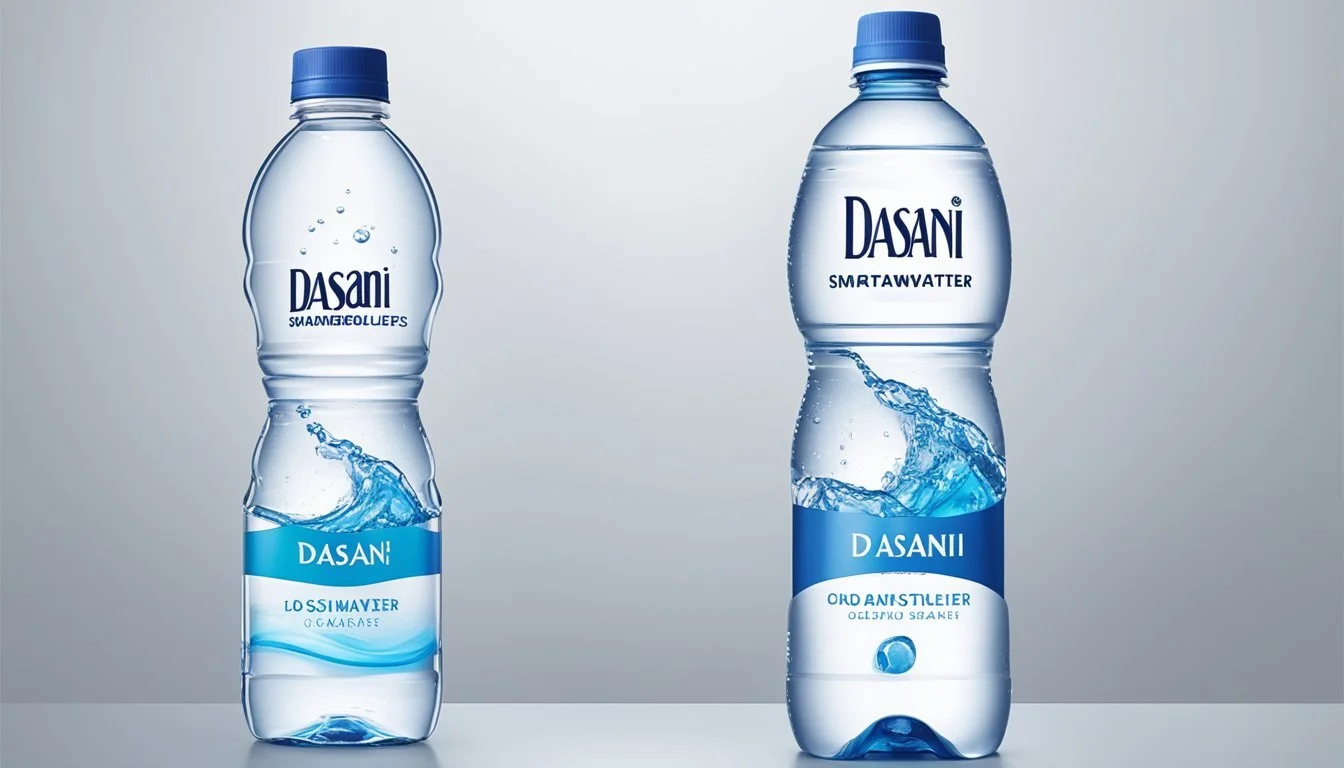Dasani vs. Smartwater
Comprehensive Comparison of Bottled Water Brands
In the vast landscape of bottled water, two brands frequently surface in consumer discussions: Dasani and Smartwater. These brands have established themselves as notable players in the bottled water industry, each with its distinct features and fan base. The bottled water market has expanded significantly, offering consumers a variety of choices, from spring waters to purified and enhanced products. Within this market, Dasani and Smartwater represent contrasting approaches to bottled water – from their source, purification processes, to the presence of added minerals for taste.
Dasani, a brand owned by The Coca-Cola Company, is known for its purification process, which includes reverse osmosis. Following purification, Dasani water is enhanced with a proprietary blend of minerals for a clean, crisp taste. In contrast, Smartwater, also under the Coca-Cola umbrella, is vapor-distilled with electrolytes added for taste. This process is inspired by the natural hydrologic cycle, aiming to deliver purity and an “elevated” taste profile.
The debate over which bottled water is better is not just about taste but also encompasses factors such as accessibility, environmental impact, and consumer preference shaped by marketing efforts. Both Dasani and Smartwater have faced their share of scrutiny and praise over the years, and as the preference for bottled water continues to rise, the discussion about these products extends beyond mere hydration to encompass lifestyle choices and brand loyalty.
The Bottled Water Industry
The landscape of the bottled water industry is characterized by strong brand presence, consumer loyalty, and trends that sway purchasing decisions.
Overview of Major Brands
Major bottled water brands dominate the market with their extensive distribution networks and brand recognition. Coca-Cola and PepsiCo are key players with their respective products, Dasani and Aquafina. Nestlé, another major contender, offers Pure Life, which is known for its global reach. Premium brands like Fiji, Evian, and Voss cater to a niche market that prefers a luxury image and distinct taste profiles, while Poland Spring maintains popularity for its smooth flavor despite some reports of plastic aftertastes. Furthermore, brands such as Essentia focus on offering ionized alkaline water, distinguishing themselves with a particular health and performance edge.
Market Trends and Consumer Preferences
Consumer preferences in the bottled water market are influenced by factors such as taste, source credibility, and perceived health benefits. There has been an increasing demand for water with added benefits, such as electrolytes and vitamins, which brands like Smartwater have capitalized on. Despite this, traditional spring waters retain their appeal due to their natural origin stories and marketing that emphasizes purity. As for market trends, there has been a shift towards sustainable packaging, with several brands now offering products in recycled or plant-based plastics to address environmental concerns. Brands are increasingly being judged not only on the quality of their water but also on the ethical and ecological implications of their products.
Manufacturing Processes
In comparing Dasani and Smartwater, the manufacturing techniques are fundamental to the quality of the final product. These processes include the water sources, their filtration and purification methodologies, and the specific enhancement techniques applied to ensure a distinct product profile.
Sources of Water
Smartwater begins with municipal water sources. It then undergoes extensive purification to remove impurities. On the other hand, Dasani utilizes local groundwater or municipal supplies as the base for its product. While the source for both brands may be similar in nature, the choice of source is critical as it influences the subsequent filtration and enhancement processes of the water.
Filtration and Purification
For filtration, Smartwater employs a process known as vapor distillation, which mirrors the hydrologic cycle. It involves heating the water into vapor and then condensing it back into a liquid. This distilled water is then carbon filtered for a final purity check. Dasani, in contrast, uses reverse osmosis and a proprietary Hydro-7 filtration process. This multi-step method effectively removes impurities and particulates to produce purified water.
Smartwater Filtration:
Municipal water
Vapor distillation
Carbon filtration
Dasani Filtration:
Groundwater/Municipal supply
Reverse osmosis
Hydro-7 purification
Enhancement Techniques
Once purified, both brands implement their unique enhancement techniques. Smartwater infuses its product with electrolytes such as magnesium, calcium, and potassium for taste and to mimic the composition found in natural spring waters. In contrast, Dasani adds a blend of minerals, including magnesium sulfate, potassium chloride, and salt, to create its characteristic taste.
Smartwater Enhancement:
Infusion of electrolytes
Taste profile similar to natural springs
Dasani Enhancement:
Addition of mineral blend
Distinct mineralized taste
Both companies have developed a sophisticated approach to delivering bottled water. Their decisions regarding sources, filtration, and enhancements shape the products' uniqueness and align with consumer preferences for purified and mineral-enriched water.
Health and Safety Standards
When assessing the health and safety standards of Dasani and Smartwater, it is imperative to consider their adherence to regulatory guidelines and safety profiles, particularly concerning contaminants and chemicals that may pose health risks.
Regulatory Compliance
Dasani and Smartwater are both subject to stringent regulatory standards enforced by the Food and Drug Administration (FDA) for bottled water. These standards encompass limits on various contaminants such as lead, heavy metals, arsenic, and certain harmful chemicals like BPA and PFAS. Compliance with these regulations ensures that the bottled water is safe for consumption and free from dangerous levels of harmful substances.
Criteria for Compliance:
Lead: No more than 0.005 parts per million (ppm)
Arsenic: Maximum of 0.010 ppm
Bromate: Threshold set at 0.010 ppm
PFAS chemicals: Advised levels are evolving, with increasing scrutiny from regulatory bodies
Brand Safety Comparisons
When comparing the brands directly, it is important to scrutinize their respective safety records and any past incidents involving contaminants. While both brands meet the FDA's health and safety standards, Smartwater touts its vapor-distilled process, which is often associated with a high level of purity by eliminating more contaminants. Dasani, on the other hand, uses a reverse osmosis filtration method which is also effective in removing impurities.
Safety Features:
Dasani:
Filtration: Reverse osmosis
Additional Treatment: Enhanced with minerals for taste
Smartwater:
Filtration: Vapor-distilled
Additional Treatment: Electrolytes for taste
Neither brand has been significantly associated with BPA, as the industry has largely moved away from using this chemical in plastic bottles due to health concerns. Additionally, there have not been widespread reports of dangerous levels of heavy metals or arsenic in either product. However, consumers may still show preference for one brand over another based on individual taste, regional water source variations, and the brand’s filtration process.
Taste Profiles
When discussing the taste profiles of Dasani and Smartwater, one must consider factors like mineral content and pH levels, as well as how they are perceived in consumer taste tests and by experts.
Factors Influencing Taste
The quality of Dasani and Smartwater largely depends on factors such as mineral enhancements and pH balance. Dasani, a Coca-Cola company product, is known to add minerals, including magnesium sulfate, potassium chloride, and salt, which may contribute to its distinctive taste. Smartwater is vapor-distilled with added electrolytes for taste, creating a different profile that some might find smoother due to its purification process.
Mineral Content:
Dasani: Magnesium sulfate, potassium chloride, salt.
Smartwater: Electrolytes added for taste after vapor-distillation.
pH Levels:
Dasani: Slightly acidic due to added ingredients.
Smartwater: Often considered neutral to slightly alkaline.
Consumer Taste Tests
Blind taste tests can offer insight into the consumer preference between Dasani, Smartwater, and other competitors. In some cases, consumers may not significantly differentiate between bottled water brands like Dasani and Smartwater, and even tap water. Preferences vary widely, with perceptions influenced by individual palates and expectations of how water should taste.
Dasani: Some consumers describe it as more "full-bodied" with a noticeable taste due to added minerals.
Smartwater: Often noted for its purity and crisp taste, potentially attributable to its distillation process.
Expert Opinions
Experts like Shane Dawson and Thrillist's Dan Gentile have offered opinions on bottled water brands. Thrillist, for instance, has conducted tests where Dasani was described with strong, specific language regarding its taste profile compared to bottled water competitors. Smartwater, being marketed as a premium product, often receives praise for its purity and taste that's attributed to the brand's distillation process and addition of electrolytes.
Dasani: Opinions vary, with some describing the taste as bearing the hallmark of American excess.
Smartwater: Typically lauded for its clean taste, though responses can be subjective.
Environmental Impact
In assessing the environmental impact of Dasani and Smartwater, it is vital to consider both the emissions from the bottling process and the effectiveness of packaging and recycling initiatives.
Bottling Process Emissions
The production of bottled water, including brands like Dasani and Smartwater, involves significant carbon emissions. Dasani, a product of The Coca-Cola Company, and Smartwater, produced by Glaceau (a subsidiary of Coca-Cola), likely share similar industrial processes given their parent company. These processes include water extraction, processing, bottling, and distribution, each contributing to the overall carbon footprint. For instance, the transportation of bottled water from the source to the point of sale largely depends on fossil fuels, resulting in carbon emissions.
Packaging and Recycling
Packaging plays a critical role in the environmental impact of bottled water. Both Dasani and Smartwater use plastic bottles, which are typically made from PET, a recyclable material. However, the recycling rates for plastic bottles can vary significantly, and not all bottles are reclaimed. The use of BPA-free plastic is a positive step, as it eliminates the risk of BPA leaching, but it does not address the overarching issue of plastic waste.
Aspect Dasani Smartwater Bottle Material Plastic (PET) Plastic (PET) Recyclable Yes Yes BPA-Free Yes Yes
Alternatively, some water brands have started packaging their products in boxed water cartons to reduce environmental impact. While neither Dasani nor Smartwater currently offer boxed water options, such innovations represent a growing trend in the industry aimed at mitigating the environmental issues associated with plastic waste.
Consumer Perceptions and Social Media
Consumer perceptions of bottled water brands like Dasani and Smartwater are notably influenced by their online presence and the endorsements they receive. Social media platforms magnify these perceptions, often swaying public opinion toward favor or disfavor.
Brand Presence on Social Platforms
Dasani and Smartwater maintain active profiles on major social media channels such as Twitter and YouTube. They utilize these platforms to engage with consumers, share product news, and align with sustainability efforts. For instance, Smartwater often showcases its sleek design and innovative filtration process across social media, while Dasani may highlight its use of PlantBottle technology. Both brands leverage Twitter for customer service inquiries and real-time engagement.
Smartwater:
Twitter: Customer engagement, product news
YouTube: Advertisements, brand messaging
Dasani:
Twitter: Customer service, sustainability efforts
YouTube: PlantBottle technology promotion
Influencer and Celebrity Endorsements
Celebrity endorsements have a significant impact on consumer preference. Smartwater, for example, gained popularity through its association with high-profile figures. Jennifer Aniston, a prominent actress, became synonymous with Smartwater advertising. Dasani has yet to associate itself with such notable celebrities on the level of Elvis Presley or presidents, which can affect its competitive standing against Smartwater.
Dasani:
Limited high-profile celebrity endorsements
Smartwater:
Jennifer Aniston: Long-term brand ambassador
The strategies deployed by these brands on social media, along with their influencer partnerships, can affect consumer choices. As they continue to innovate in branding, Smartwater and Dasani also face competition from other bottled waters like Lifewtr and Ethos Water, the latter being part of Starbucks' commitment to providing clean water.
Price Comparisons and Accessibility
When selecting between Dasani and Smartwater, consumers often consider price and availability. The following subsections detail the specifics of retail pricing and regional availability for both brands.
Retail Pricing Strategies
Dasani and Smartwater, both produced by The Coca-Cola Company, have varying retail prices influenced by bottle size, packaging options, and store type. In general, Dasani is marketed as an affordable choice compared to Smartwater which is positioned as a premium product. For instance, at a typical grocery store in Texas, a 500 ml bottle of Dasani might cost around $1.00, while Smartwater of the same size is priced closer to $1.50.
Availability Across Regions
Both brands boast widespread distribution across the United States. However, Smartwater has a more distinct presence in urban and upscale markets, often associated with a healthier lifestyle image. Meanwhile, Dasani is ubiquitously found in a variety of settings, from convenience stores to vending machines. Internationally, accessibility varies; Smartwater is available in regions like Norway, featuring vapor-distilled water with electrolytes added for taste, which might appeal to markets with a preference for such enhancements. Dasani's presence in global markets may be more limited compared to Smartwater due to differences in local partnerships and distribution strategies.
Conclusion
When comparing Dasani and Smartwater, consumers must consider their hydration needs and personal preferences. Both brands offer distinct characteristics that cater to different tastes.
Dasani, a product of The Coca-Cola Company, is often criticized for its taste, which some attribute to the added minerals. Despite this, it still serves as a hydration option that is widely available and meets the standard requirements for bottled water.
Smartwater, also produced by The Coca-Cola Company, is marketed as a premium product. It is vapor-distilled with electrolytes added for taste. This brand has established a reputation for a clean, crisp taste that appeals to a segment of consumers looking for a more "upscale" bottled water.
Aspect Dasani Smartwater Purification Filtered and added minerals for taste Vapor-distilled with added electrolytes Taste Often described as more mineral-like Known for its crisp and clean taste Brand Image Mass-market and readily available Marketed as a premium product
Consumers should choose based on their hydration needs and taste preference, as both brands are equally effective at providing hydration. Considering environmental impact, it is advisable to rely on reusable water bottles when possible, regardless of the chosen brand. In conclusion, both Dasani and Smartwater offer viable options for bottled water, with the choice ultimately depending on individual preference and priorities.






